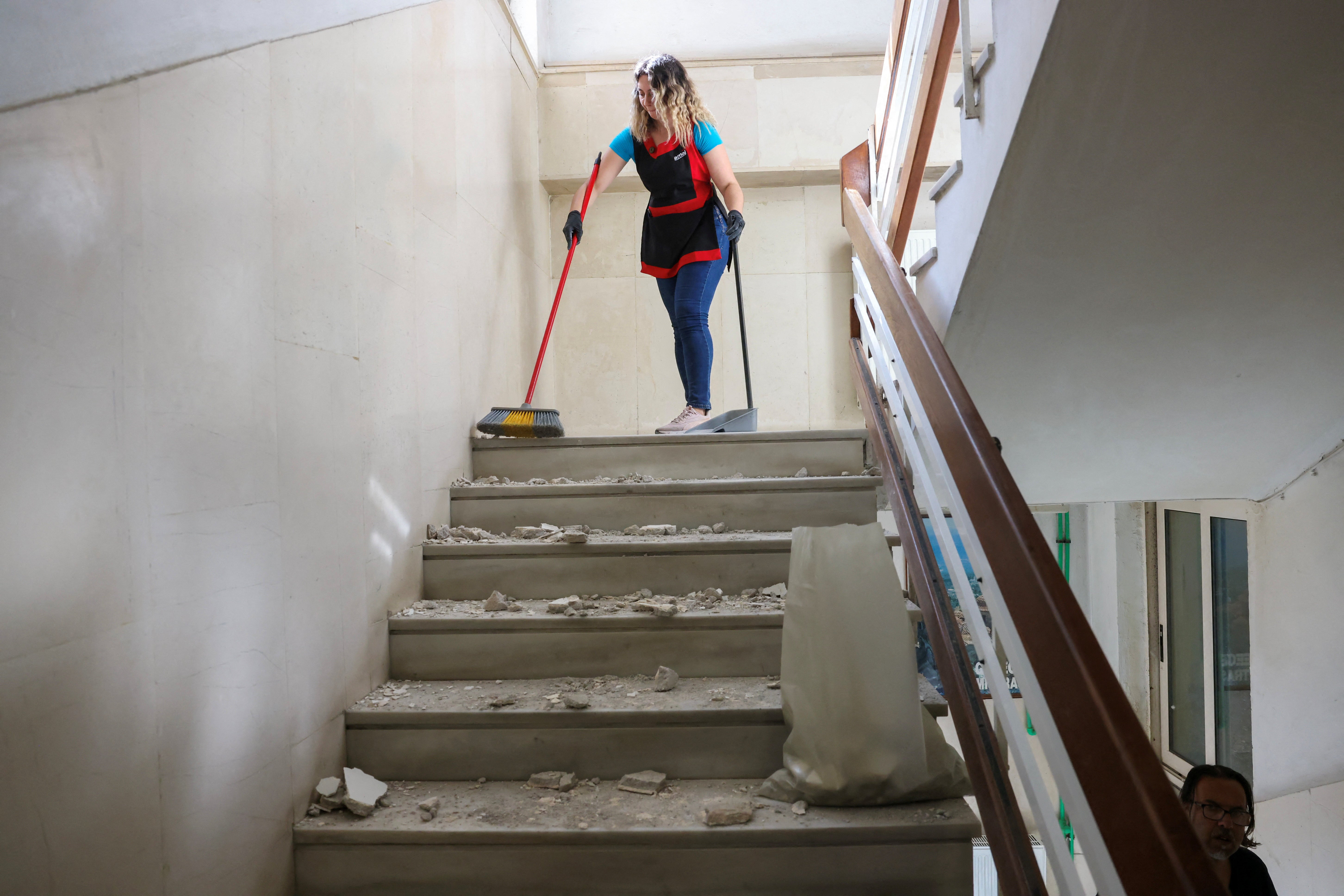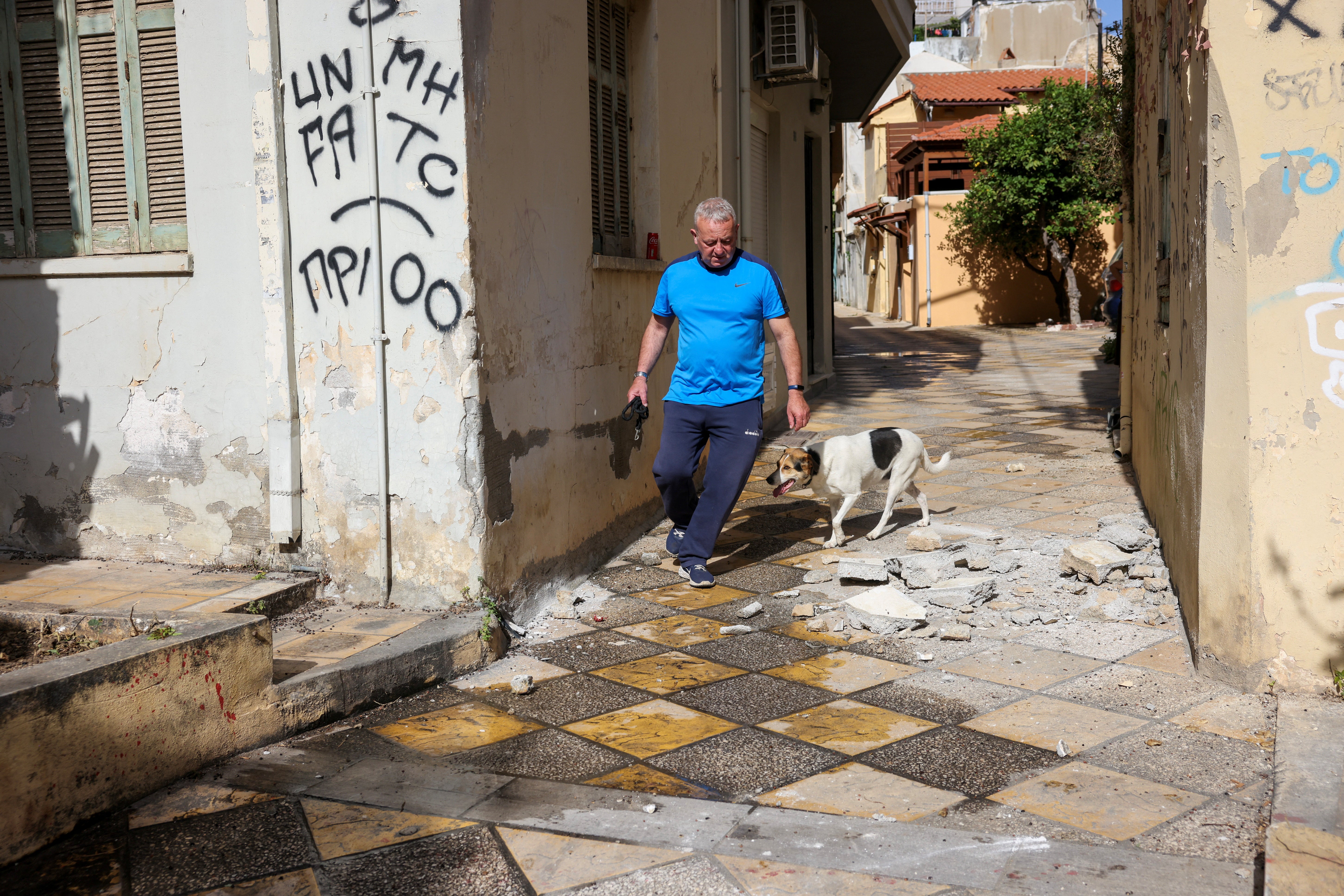A magnitude 6.1 earthquake struck off the coast of Crete on Thursday morning, as the tremors were felt across the Greek island and the Aegean Sea region.
Authorities have not reported any serious injuries or structural damage, aside from some minor landslides and debris, especially near Crete’s capital, Heraklion.
While independent seismologists issued tsunami warnings, Greece’s Earthquake Planning and Protection Organisation says that tsunamis are unlikely due to its location out at sea and depth.
The island of Crete is known as one of Europe’s most common zones for earthquakes. This recent tremor comes only a week after an earthquake with a magnitude of 5.9 struck off the eastern coast of Crete, which was felt as far away as Egypt.
The island is a beloved destination for tourists, many of whom would have started flocking to the Greek island as the summer season begins.
It is a popular holiday location due to its pristine beaches, thriving resort scene, rich history and unique natural landscapes often explored on hikes and trails. One such popular hiking trail, Imbros Gorge in Sfakia, has been temporarily closed for visitor safety after the earthquake hit.
Here is what we know about the earthquake so far.
Is it safe to travel to Crete, Greece?
The European-Mediterranean Seismological Centre (EMSC), an independent science organisation, issued a warning of potential tsunami activity, stating 15 minutes after the earthquake that people should “move away from the coast and reach a higher place. Follow national authorities’ directives.”
“Aftershocks may occur in the next hours/days. Unless it is necessary, stay away from damaged areas for your safety. Be careful and follow national authorities’ information,” the organisation added.
The Greek fire brigade said in a press release that all civil protection forces were immediately mobilised, but so far the fire department has not received any calls for help, but has been placed on high alert.

The UK’s Foreign, Commonwealth & Development Office currently does not have any travel advice regarding Crete or Greece as a whole, meaning it should be safe to travel to the country and its islands.
Some minor landslides and debris were observed, especially near Heraklion, but authorities have not reported any serious injuries or structural damage.
Regional government official Giorgos Tsapakos told state-run television that “there are no reports of injuries or any serious damage” following initial examinations of the areas affected by the earthquake.
Where was the earthquake?
.png)
The earthquake struck north of the Greek island of Crete at 6.19am local time on Thursday 22 May.
The quake struck roughly 60 kilometres north-east off the Greek island, with various geoscientific surveys reporting its depth from between 37 and 87 kilometres deep.
Shaking was felt over 700km by approximately 13 million people in Greece, Turkey, Cyprus, Egypt and Lebanon, the EMSC stated.
Residents in eastern Crete reported on the EMSC website that they felt the tremor, including some saying they woke up as their beds started to shake, but no evacuations were ordered.
Is a tsunami likely?
Efthymios Lekkas, head of Greece’s Earthquake Planning and Protection Organisation, said the earthquake’s location at sea and its significant depth have made a tsunami unlikely.
According to the Greek daily Ta Nea, Mr Lekkas explained that the earthquake occurred at a significant depth, making it less likely to cause severe surface damage.
He said the earthquake struck at the junction of the African and European tectonic plates.
Vasilis Karastathis, the director of the Geodynamic Institute, also told OPEN television: “We were expecting a revised solution to come out, it is 60 kilometres deep and does not pose a danger at such a depth and so many kilometres away from Lasithi and the coast.”
“There is no problem. We will also look at the aftershock sequence, but I do not think it will be intense. With these characteristics of the earthquake, we do not expect any aftershock sequence. There is no need to be concerned,” he said.
“When it is large, the depth opens up the distance, which is why it was felt in Attica and was quite large,” he added.
Are other Greek Islands at risk?
None of the islands, the mainland, or other countries have reported injuries or serious property damage as of Thursday morning.
It has not been unheard of in the past for earthquakes to affect the country, which is prone to seismic activity. Just last week, an earthquake with a magnitude of 5.9 struck off the eastern coast of Crete, hitting near the islands of Kasos and Karpathos, smaller islands near Crete’s east coast in the Mediterranean Sea, at a depth of 35km.
Unprecedented levels of activity also shook the popular tourist island of Santorini for weeks earlier this year.
The island of Crete is known as one of Europe’s most common zones for earthquakes. In October 2021, a 6.3 magnitude quake shook the island just weeks after a deadly tremor killed one person and injured dozens.

Greece sits at the line between the African and Eurasian tectonic plates, so it is common for seismic activity to be felt there.
Greece has thousands of islands, with about 227 of them inhabited, the largest of which is Crete by population and area. The islands are traditionally grouped in different clusters, such as the Argo-Saronic Islands, the Cyclades, the North Aegean Islands, the Dodecanese, the Sporades and the Ionian Islands.
Are flights cancelled?
Heraklion International Airport on Crete also has no cancellations or disruptions to its flight schedule, data from FlightRadar shows.
Chania International Airport, also on the island, has not seen any significant disruptions to its flights.
Can I cancel my holiday?
As the Foreign Office has not warned against non-essential travel to Greece, there will be no special circumstances in place to be able to cancel a trip for a full refund.
The conditions for cancelling your trip will be dependent on your holiday provider, so it’s best to contact them if you’re looking to postpone.
There is no obligation for companies to refund bookings if you want to cancel, and you will not be able to claim travel insurance due to safety concerns unless the Foreign Office advice changes.
In terms of travel insurance, some policies include natural disaster cover for an event that prevents you from reaching your holiday destination. Check your insurance policies and speak to your insurer to see where you stand.
For more travel news and advice, listen to Simon Calder’s podcast
